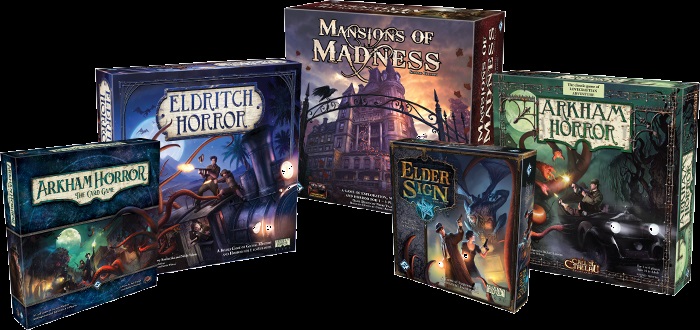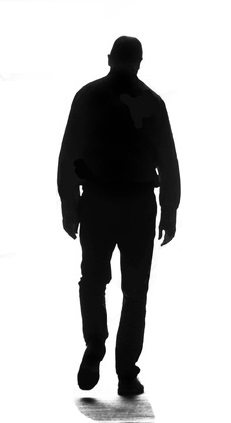Encountering Change
By Anthony Casperson
2-25-23
If you spend time interacting with various YouTube/Twitch videos which focus on the board gaming hobby, you’ll likely notice the channels showcase certain games. Consistencies of games that aren’t quite “classics” but do have a regular following among the general gaming sphere.
Several of these games fall into a sphere of similar worldbuilding which draws inspiration from the Lovecraftian—or Cthulhu—mythos. This mystical version of the Prohibition Era where ancient, unknowable “gods” and the cults that seek their return take center stage. Games like Eldritch Horror, Elder Sign, Mansions of Madness, Cthulhu: Death May Die, and pretty much anything with “Arkham” in the title—unless said game has connection to Batman’s eponymous asylum, which finds it’s own name’s inspiration from the same mythos.
While I find some of these games interesting to watch others play (although even that depends on the dynamic of the players involved), none have ever struck me as a game that I’d like to play. The reason for this is because, most of the time, it seems like these Lovecraftian games want players to lose. The odds appear to be supremely stacked against your characters. Even those who’ve played the game/scenario before and learned the most optimal path of play only have an even chance of winning the game.
The reason for this is that the game developers lean heavily into the pessimistic tone of Lovecraft’s stories. Hardly any character in the original tales walks away unscathed from their encounters. Many die. Most others go mad. And those lucky few who “succeed” in their task, bear scars that will haunt them for the rest of their lives.
These stories remind we humans of the fragility of the human condition. We’re not the conquering heroes. Not the victorious underdogs. No, humans are weak and frail beings interacting with entities beyond our capabilities. Especially when we deal with something so ineffably alien to our finite experience.
And when we have a face to face encounter with the ineffable, it changes us. Leaves a mark on us that lasts for the rest of our lives.
In a sermon that I’ve recently written (but is still upcoming for the Ephesians series here on Brushstrokes of a Theonerd) I mention this idea that encountering the ineffable changes us. And I apply it to our encountering of the God of the bible. But there wasn’t time in the sermon to dive deeper into this concept because there was so much else to delve into within the verses. So, I figured I could write about it here, while not really spoiling anything in the sermon.
We could look to quite a number of passages throughout the bible to see how encountering God dramatically changed his followers. (Although the lasting marks of coming face to face with God are less pessimistic than the indescribable beings of Lovecraft’s invention.) But, we’ll take a quick look at three changed biblical characters.
The first of these is Moses. The changes in this Old Testament figure are too numerous to count. He went from a murderous exile who claimed he couldn’t speak very well to the leader of the nation of Israel and mouthpiece of God. But the change I want us to look at is more of a physical one that happened when this prophet came as close to a face-to-face encounter with God as anyone could before the incarnation of Jesus.
Looking at Exodus 34:29-35, we see that the interaction with God left Moses’ face shining with an inhuman brightness. It was as if the holiness of God had left an echo physically on the man. Anyone who looked at Moses couldn’t help but recognize this sacred mark burned into his skin.
The residual reflection of divine holiness drove the people to the same fear of God that they would have if they were to face their Creator himself. And it called for change in those who saw Moses as well. Almost immediately after Moses revealed his shining face after having this encounter with God, the people asked him to cover it up with a veil.
When we truly encounter God, it should change us in such a way that none can doubt its holy mark. And call those who see it to the same holiness.
A second changed person is Peter. We could look to the change between the man so fearful that he denied his Lord, but then almost two months later preached an amazing sermon to the same crowd that called for his Lord’s crucifixion. However, I think that one of his early encounters with Jesus reveals a good point.
In Luke 5:1-11, Peter had worked a full shift of fishing. He was just finishing the clean up of a disappointing failure of a night without a single fish caught. But Jesus walked up to him and asked Peter to put a boat out a little way to preach to the people, using the acoustics of the lake to reach a large crowd. And the tired and frustrated fisherman obliged the preacher.
After the sermon was over, Jesus had Peter go further into the sea and have another go at fishing. No doubt, with a questioning look of “Sure, we don’t have anything better to do than waste our time doing another shift of fishing—at the wrong time of day,” the tired and frustrated fisherman again obliged the preacher.
However, when the unexpected catch of fish—which was so large it nearly broke the nets—was finally hauled into the boats, Peter realized he’d come face to face with God and knelt amidst wriggling fish in worship.
There was Peter, probably with the biggest haul of his life. In a boat so full, it was about to overflow with water. But his mind wasn’t on how rich he was going to be because of this bounty. It wasn’t on how he was about to lose both the catch and his boat if he didn’t do something quick.
No, his mind was only on his Lord, God enfleshed in humanity right before his face. And when that encounter had passed, and he’d gotten the boat and haul to shore, he and a few others left it all behind to follow Jesus.
When we truly encounter God, it should change us in such a way that worshipping our Lord should be at the forefront of our minds. And should make us willing to give up everything for one more second in his presence.
The final example of change in the life of a biblical character is Paul. The enemy of this rising sect of people who spoke of a dead man having been raised. Paul was so against these supposed idiots that he zealously pursued the full extent of the Law against them. He was ready to show these people the error of their faith, even if he had to kill them to prove it.
And this is where we find Paul in Acts 9:1-8, just before he had his first encounter with his Savior and God. On the road to Damascus, with a command from the high priest himself for the destruction of this duplicitous sect, a blindingly bright light enveloped him.
The risen Jesus, the glorified God in human flesh, appeared to him and spoke. Paul received instructions that would change the trajectory of his life forever. Jesus called him to take the same zeal he’d had as a persecuting enemy and use it to spread the truth of his resurrected Lord.
As well, Paul was to enter Damascus seeking a follower of Jesus. Not to kill, but to find healing for the blindness Paul suffered because of this encounter. So that his returned physical sight might match his new spiritual sight.
When we truly encounter God, it should change us in such a way that our false preconceptions of what it means to live a good life fall away, even if it means we have to admit that we’d been on the wrong side. And should lead us to lives focused on his calling in our lives instead of what we long thought was right.
Encountering God changes us. It leaves a mark that lasts for our lives. And every time we come face to face with our Creator, it should leave us more changed. Ever and ever more like God in his holiness.
The question for us is, “Have we experienced change in our lives?” Have we put the betterment of others ahead of ourselves? Do we seek the work of God regardless of our circumstances? Have we been made whole and complete as the person he’s called us to be? Has God’s longsuffering nature that extended forgiveness to us taken root in our lives? Have we come to view right and wrong by God’s definition? Do our lives reflect that same perspective of right and wrong? Have we come to be as reliable and dependable as the God who will never leave us or forsake us? Have we learned to accept God’s guidance in our lives? Do we no longer fall prey to the call to sin that had once held so firmly in our lives?
If no change has happened (regardless of the actual extent of each change) then we did not encounter God. It is impossible to experience his presence without it changing us. Maybe we don’t yet see the change. Maybe we’re too close to the situation to see it. But change does happen whenever we encounter God.
What is he changing in you?




